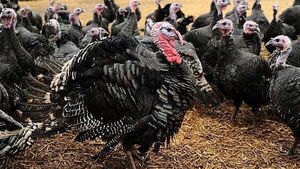No threat to Christmas turkey supplies yet — Chief Veterinary Officer

By Bairbre Holmes, PA
June Fanning, Chief Veterinary Officer at the Department of Agriculture, has said that strict biosecurity is ”really, really important” for the poultry industry.
Dr Fanning told RTÉ radio’s Morning Ireland that biosecurity was the best protection during the current bird flu outbreak.
Actions such as changing footwear and clothes before interacting with birds, feeding commercial birds away from wild birds, reducing interaction between wild birds and “kept” birds, were important as were cleaning and disinfection of vehicles and reducing the number of visitors.
“The currently circulating strain of bird flu is of low risk to humans, so that is good news but the advice still is that if people come across sick or dead wild birds or if they've poultry themselves that are sick, not to touch or interact with the birds because there is that human health risk, however low.
“Unfortunately for birds, it's highly pathogenic strain, it's very contagious so it spreads very easily between birds, and it also causes severe signs, including death in the birds. So you've got everything from respiratory symptoms to blue discolouration of the comb and wattle to reduced egg production and generally all forms of food and drink as well.”
Dr Fanning said that a suggestion from the IFA about housing poultry was “a tool in the toolbox”.
“It alone is not protective, so we're working very closely with the industry and it's an evolving situation. So housing alone won't protect the birds because obviously the virus can be walked in on dirty footwear into a house.
"However, it is an additional measure so we are looking at all mitigants at the moment type thing so we wouldn't rule anything out at this stage.”
Dr Fanning said that the current outbreak was “quite small” and there was no concern about stocks of turkeys for Christmas.
“But it's contagious and it's here. It is contagious and it's here. We've had experience previously, in 2022 was the last time we had commercial outbreaks. Industry has been really good at working with us in relation to biosecurity. It is highly contagious, so it is a threat, but we have measures in place.”
It comes as an outbreak of bird flu was confirmed at a commercial turkey flock in Co Carlow.
In a statement, the Department of Agriculture, Food and the Marine said a 3km protection zone and 10km surveillance zone have been put in place in the area.
The Minister for Agriculture, Martin Heydon, said: “Strict biosecurity is the best defence we have against the threat of avian influenza.
“Thankfully, the disease poses no food safety risk to consumers of well-cooked poultry products, including eggs.”
The virus, which causes the disease, is known as HPAI H5N1 and has been in circulation among wild birds over the past year.
On Tuesday, Fota Wildlife Park in Cork confirmed it will remain closed to the public until at least the end of November after an outbreak among its animals.
Avian influenza can be very contagious between birds, but health authorities have advised that the risk to public health from the strain of Avian Influenza currently circulating is very low.
But they have warned members of the public not to handle dead or sick birds and, instead, to report them via the Department’s avian check app.
Compulsory biosecurity measures have been in effect since Saturday and require keepers of all captive birds to implement the specific procedures, regardless of the size of their flock.
Additional enhanced biosecurity measures must be implemented in flocks of 350 birds or more.
All bird owners are being warned to be vigilant for signs of disease in their flocks, which vary between species but can include: swollen head; discolouration of neck and throat; loss of appetite; respiratory distress; diarrhoea; and fewer eggs laid.
If flu is suspected, owners should notify the nearest Regional Veterinary Office or ring the Avian Influenza Helpline on 01 607 2512.
Additional reporting Vivienne Clarke




